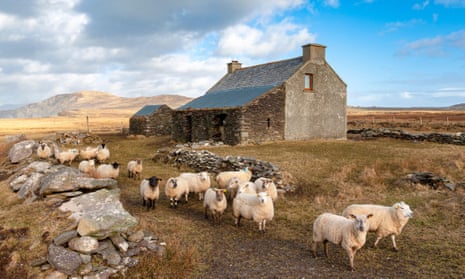 |
| Valentia Island, County Kerry, Ireland. Photograph: Stephen Power |
Water by John Boyne review – a cathartic journey of recovery
A woman retreats to a remote Irish island following the collapse of her life, in the first of a series named for the four elements
Barney Norris
Tuesday 23 November 2023
Though perhaps still best known for The Boy in the Striped Pyjamas, John Boyne has been highly productive since the critical success of his 2017 novel The Heart’s Invisible Furies. He is now embarking on a quartet of interlinked novellas, which will appear biannually over the next two years. The cohering theme is the four elements – so Water will be followed in due course by Earth, Air and Fire.
The verbal representation of water has a rich literary history, from Virginia Woolf’s The Waves to Alice Oswald’s Dart. However, readers anticipating playful linguistic responses to the elements will be disappointed – water, in this book, is something to swim in, drown in or live next to. Though the novella’s title gestures towards the baptismal, cleansing nature of the story it tells, the metaphor remains implicit, and is never really drawn out in the course of the book. What Boyne offers instead of innovation is an almost note-perfect piece of first-person storytelling.
Vanessa Carlin – who changes her name to Willow Hale at the outset – retreats to an isolated island cottage following the traumatic collapse of her life. This journey seems to be one of the principal narrative archetypes of Ireland – I cherish great books on the same theme by Sara Baume and John Banville, and that’s just the Bs. Perhaps it wouldn’t be too much of a stretch to suggest this particular form of island elegy owes something to the influence of Yeats’s poem The Lake Isle of Innisfree. The genre offers a vision of storytelling as a reflective act, where pain, out of its context, can be confronted and transmuted into acceptance, perhaps even grace. This process of catharsis provides the rhythm to Boyne’s novella.
Willow’s pain is harrowing to confront – it involves the imprisonment of her husband for crimes the world has assumed that she enabled, and a tragedy those crimes have visited on her family. Withdrawing from the world she knew, she finds herself immersed in a new one, encountering an island community where the old ways are starkly in conflict with the new. A gay couple has been run out of town and a youngest son has to stay at home to help on his family’s farm; but at the same time, the vicar grew up in Benin City, and a talented young footballer is getting ready to reject his father’s expectations. There are others hiding their shame on this island, too – a man who seems to ask for forgiveness from Willow, which she firmly denies him, as she gathers the strength to reject her husband’s pleas for sympathy once and for all, a vital step towards her own recovery.
Boyne’s novel is propulsive and deftly dramatised, so that Willow’s journey of recovery is almost always expressed through human interaction, her story told in a series of scenes rather than through interiority. The elements may not come in for much interrogation here, but Boyne’s deep interest in people and his willingness to confront traumatic subject matter make for a compelling first instalment to his quartet.
Water by John Boyne is published by Doubleday (£12.99).
THE GUARDIAN


No comments:
Post a Comment